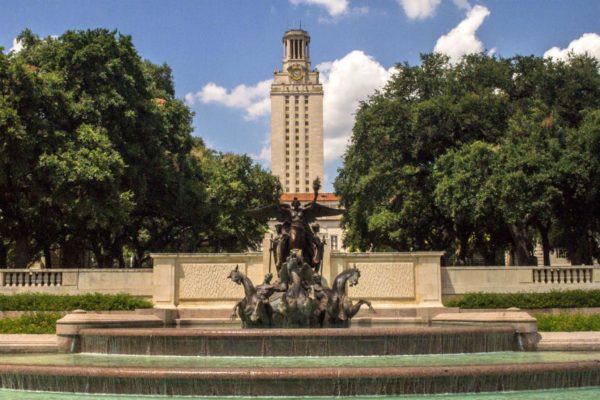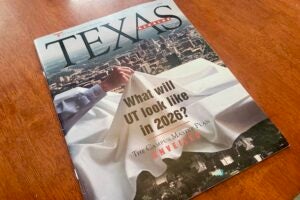Today, U.S. government leaders have enormous decisions to make about tax reform. Their choices will affect the future of our students and our universities. If the proposed policies are put in place, the ability of Texas students, both now and in the future, to earn life-changing degrees will be compromised.
We are the presidents of two universities in Texas — one public, one private. And many students from both The University of Texas at Austin and Trinity University rely upon financial aid that is drawn from endowments.
Both the House and Senate bills that are now being resolved by a conference committee propose a 1.4 percent excise tax on certain private nonprofit university endowments. This puts the college educations of many current and prospective students at risk, and it jeopardizes the financial stability of many private universities. The recent Senate vote on the tax bill brought Congress one step closer to enacting this and other policy changes that will have dire impacts on affordability at all American universities.
At a time when we face increases in economic and scientific competition around the globe, lawmakers should work to expand access to higher education. An educated and highly skilled American workforce benefits everyone, and it is our responsibility to ensure we maintain our global leadership role. Unfortunately, both the House and Senate tax bills counteract our national effort to do just that.
Endowments are a critical source of student financial aid. Universities across the U.S. provided $54.7 billion in grant aid to their students in 2015-16, much of it from endowment investment funds.
In fact, the institutions affected by the proposed tax are among those providing the most generous financial aid from their own resources, including endowment funds. At many of these schools, for example, grant aid spending is 20 times the total amount that students receive from federal programs like Pell Grants, which are capped at $5,920 per award year.
Trinity University is one of these schools, and it spends more than $50 million on student financial aid each year, with endowment funds supporting 95 percent of students. This aid is possible thanks to generous donations by private individuals who believe in the proven value of higher education. Trinity then invests those gifts and uses the returns to help low-income students finance higher education. If enacted, this tax would take away aid from more than 70 Trinity students each year, or, to echo the words of Vanderbilt University Chancellor Nicholas Zeppos — it would send, in effect, 70 need-based student scholarships directly to the federal government.
Beyond the direct impacts to students and their hardworking families, this tax would set a dangerous precedent in nonprofit tax policy. Public universities such as UT Austin are rightfully concerned.
Every year, UT Austin relies on the generosity of private donors to fund scholarships for thousands of students in a wide range of schools and colleges. These are transformative gifts that reshape the academic experience on our campus.
This kind of giving is made possible through proper investment of endowment funds. If the new tax on private nonprofit universities were levied on public nonprofit universities, many UT Austin scholarship programs and others like them would decrease dramatically or disappear completely.
Taxing private university endowments will harm students throughout Texas by making college less accessible and less affordable.
Higher education has brought our nation to the forefront of scientific discovery, propelled our economy and made the U.S. the flourishing country it is today. America’s high-quality pre-eminent private universities — part of the lifeblood of a strong economy — should be celebrated and championed for their contributions to America’s scientific and economic health, not punished with debilitating government taxation.
We urge House and Senate lawmakers to consider the long-term consequences of their policies as they make final edits to this important tax bill. The future of students in Texas and across the U.S. depends on it.
Gregory L. Fenves is the president of The University of Texas at Austin. Danny J. Anderson is the president of Trinity University.
A version of this op-ed appeared in the Houston Chronicle, Dallas Morning News, Austin American Statesman, Corpus Christi Caller Times, Waco Tribune Herald, Abilene Reporter News, Texas Monthly and the El Paso Times.
To view more op-eds from Texas Perspectives, click here.
Like us on Facebook.




